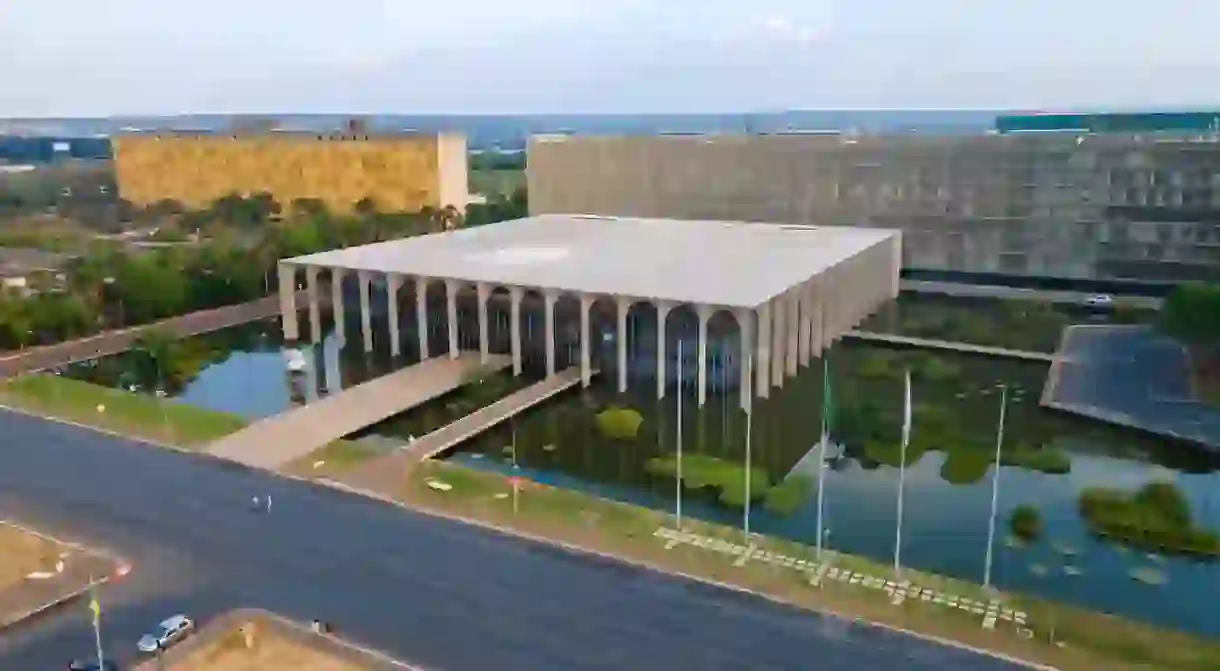The Top 10 Things To Do and See in Brasília

By the end of the 19th century Brazil had decided upon creating a new utopian capital city. Construction began in the 1950’s and was heavily influenced by the writing of the Italian monk, Dom Bosco, who dreamed of a utopian capital city in the New World. The city officially became Brazil’s capital in the 1960s and was named a UNESCO World Heritage Site. We show you the most impressive and exciting attractions to experience.
Planning a trip to Brazil? Take a look at the best bookable tours, trips and experiences in Brasília, the capital of Brazil
National Congress
Building

The building of the National Congress is as old as the city of Brasília itself. It was designed by the architect Oscar Niemeyer and consists of a flat based structure with two high buildings, where the offices of the members of parliament are located. Besides the members of parliament, the National Congress also houses the federal senate. Visitors have the possibility to visit the Congress and its rooms from the inside and without any entrance fee.
CCBB - Centro Cultural Banco do Brasil
Building, Theater
The Centro Cultural Banco do Brasil is a network of cultural centers, which are located in São Paulo, Rio de Janeiro, Belo Horizonte and Brasília. The building of the cultural center in Brasília, was designed, like the National Congress, by Oscar Niemeyer. The CCBB offers rooms for film showings, theater performances, concerts, and exhibitions.
Parque Municipal do Itiquira
Park
The main attraction of this park is the Itiquira waterfall, standing at 168 meters making it the highest waterfall in the whole of Brazil. By comparison, the highest waterfalls in the Iguaçu Falls are only about 82 meters high. The park of Itiquira is a real natural oasis and the perfect destination for day trips from the capital city. Visitors will find a nature trail, possibilities for swimming in the water of the waterfalls or just relaxing in nature.
National Theater Cláudio Santoro
Theater

Like the majority of Brasília’s buildings, the National Theatre was designed by Oscar Niemeyer in the modern architectural style and was completed in 1966. The National Theatre Cláudio Santoro was named after the important Brazilian conductor, composer, and violinist of the same name. The complex has three theater halls which seat nearly 1,800 people and show plays, concerts, and conventions.
Juscelino Kubitschek Memorial
Memorial, Park

The Juscelino Kubitschek Memorial, or just called Memorial JK, is located nearly the city park of Brasília and is dedicated to the founder and first president of the capital city of Brazil, Juscelino Kubitschek. A 4.5 meter statue of the president stands on a concrete platform in the park, as well as the mortal remains of Kubitschek and the various honors and medals he received during his lifetime.
Supreme Federal Court
The Supreme Federal Courtof Brasília is located nearby the National Congress and is the highest court of law in Brazil for constitutional issues. It was already founded during the colonial era and therefore has a long and fascinating history, which visitors can learn about.
National Park of Brasília
Park

The National Park of Brasília is located just outside of the center of the city and features many different animal species living there, as well as natural mineral pools for swimming. It’s a brilliant park for the whole family and is popular with both locals and tourists.
Santuário Dom Bosco
Building, Church
This church is definitely one of the highlights of Brasília. Unremarkable from the outside, it impresses on the first step taken into the building. Square-shaped, with long windows on each side, made of different blue colored Murano glass bricks presenting a starlit sky. This church is dedicated to the patron saint of the city, Dom Giovanni Melchiorre Bosco, and opened its doors in 1963. Santuário Dom Bosco was built using the design of Carlos Alberto Naves, a Brazilian architect.
Catedral Metropolitana Nossa Senhora Aparecida
Building, Cathedral, Church

The Catedral Metropolitana Nossa Senhora Aparecida, is a Roman Catholic church designed by the architect Oscar Niemeyer and inaugurated in May 1970. Its name relates to the biggest place of pilgrimage of Brazil called Aparecida and translates as ‘the appeared’. It is worth visiting because of its acoustics, which allow communication in low volume to be heard from one end of the building to the other.
Paranoá Lake
Paranoá Lake is an artificial lake which was planned at the end of the 19th century, but only put into practice in the 1950s under president Juscelino Kubitschek. It has a maximum depth of 30 meters and has three little islands, which were created while the lake was flooded. It is perfect for swimming, relaxing, water sports, and enjoying the beautiful sunsets in the evenings.













